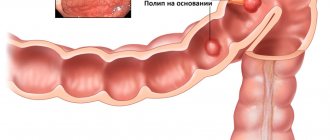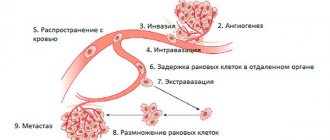The anus is the opening through which feces leave the rectum. In the anus, there is an orifice (the opening itself) and an anal canal - a small area that is located below the rectum. Malignant tumors in this area are rare.
- Causes and risk factors for anal cancer
- Classification of anal cancer
- Stages of anal cancer
- Symptoms
- Diagnostic methods
- Anal cancer treatment
- Radiation therapy for anal cancer
- Chemotherapy
- Survival prognosis
Causes and risk factors for anal cancer
Like any malignant tumor, anal cancer occurs due to the fact that mutations occur in cells, due to which they become “immortal”, multiply uncontrollably, acquire the ability to grow into surrounding tissues (invasive growth), migrate throughout the body and give rise to secondary foci in different organs. The exact causes of these mutations are unknown.
There are some risk factors that increase the likelihood of developing anal cancer:
- One of the main risk factors is human papillomavirus infection. Human papillomavirus (HPV) is found in many anal cancers.
- Age. The main contingent of patients are people over 50 years of age.
- Anal sex. Chronic irritation and inflammation can lead to changes in the mucous membrane. In addition, there is a risk of HPV transmission through unprotected anal intercourse.
- Smoking. A bad habit increases the risk of many types of cancer, not just in the lungs.
- Complicated anamnesis. Anal cancer is more likely to develop in women who have been treated for cervical cancer.
- Decreased immunity due to taking immunosuppressants, HIV infection.
Key measures to prevent anal cancer include safe sex, HPV vaccination, and quitting smoking.
Psychological support
American scientists conducted a study on the influence of internal psychological state on improving the effectiveness of cancer treatment. Practice has shown that a positive emotional attitude increases the chances of recovery in stages 2 and 3 by 55%, and in stage 4 by 25%6.
In Russia there are few support groups for patients with prostate cancer. One of them is a support group forum on the Doctor and Me portal. In addition to useful practical advice about living with cancer, forum visitors share problems and personal experiences. Despite the lack of attention to the problem of erectile dysfunction when diagnosed with cancer, treatment can be started after talking with a doctor or nurse.
The patient can also contact the psychological assistance service of the charitable non-profit project Help-Patient.ru. By calling the hotline 8-800-100-01-91 or by email, an experienced specialist will help cancer patients and their relatives when making decisions, provide information and psychological support in difficult life situations, give recommendations on what to do first, and provide the address the nearest oncology facility where medical care can be provided. The organization provides psychological assistance, not medical consultation.
Classification of anal cancer
Depending on the structure of the tumor tissue under a microscope, the following types of anal cancer are distinguished:
- Squamous cell carcinomas (squamous cell carcinoma) are the most common, occurring in about 9 out of 10 cases. They can develop from cells of the mucous membrane of the mouth and anal canal. Sometimes squamous cell carcinoma occurs on the skin in the anal area.
- Adenocarcinomas originate from glandular cells at the top of the anal canal.
- Paget's disease is a type of adenocarcinoma that develops from sweat gland cells in the skin in the anal area.
- Basal cell carcinoma (basal cell carcinoma) is a malignant skin tumor. It can occur in the anal area, but this is an unusual location for her. Most often, such tumors are located where the skin is constantly exposed to sunlight.
- Melanoma is not a cancer; it is a malignant tumor that develops from pigment cells that produce melanin. Sometimes it is found in the anal area - on the skin or mucous membrane.
In some cases, squamous cell carcinoma of the anus develops against the background of a precancerous condition - anal intraepithelial neoplasia. Due to human papillomavirus infection, cells lose their normal features and begin to multiply too quickly.
Melanomas of the anal canal
They make up about 18% of all malignant tumors of the anal canal and almost 1.5% of melanomas of all localizations.
The clinical picture and diagnosis of melanomas of the anal canal are similar to those of squamous cell carcinoma of this area. Of the diagnostic procedures, special attention should be paid to biopsy (taking a piece of the tumor for examination). It is well known that melanoma biopsy is strictly contraindicated! However, almost all patients undergo a tumor biopsy before hospitalization, which significantly worsens the prognosis (outcome) of the disease.
Melanomas of the anal canal are usually pink in color, not black, like on the skin, and are not pigmented to the eye. Biopsy contributes to the generalization of the tumor process and worsens long-term treatment results.
At the slightest suspicion of melanoma of the anal canal, a less traumatic, but diagnostically no less informative method should be used - a cytological examination of fingerprint smears taken from the surface of the tumor.
Locally advanced forms of melanoma of the anal canal are much less common than with squamous cell carcinoma, but melanomas of this localization are characterized by early generalization of the process and distant metastasis.
Local recurrence after local excision of small melanomas is rare. This allows for small exophytic (outward growing) melanomas, especially those on the legs, to use a sphincter-preserving treatment method - cryodestruction (low temperatures).
For tumor sizes less than 3 cm, the use of cryodestruction is an adequate, radical method of treatment. However, local relapse is not observed in these patients.
Long-term treatment results for anal canal melanomas are generally unsatisfactory: the 5-year survival rate is 17%.
Stages of anal cancer
The earliest stage is “cancer in situ.” The tumor has just begun to grow and is located in the upper layer of the mucous membrane or skin. It does not grow into the wall of the anal canal, does not spread to the lymph nodes, and there are no distant metastases. “Cancer in situ” is easily treated, but it is not always possible to diagnose it on time. The tumor further progresses:
- Stage I. The neoplasm is less than 2 cm in diameter.
- Stage II. The tumor diameter is 2–5 (substage IIA) or more than 5 cm (substage IIB).
- Stage III. Cancer cells have spread to the lymph nodes that are located near the rectum, or the tumor has grown into neighboring organs: the vagina, prostate gland, urethra, bladder.
- Stage IV. Anal cancer with metastases.
Book a consultation 24 hours a day
+7+7+78
Classification
Histology reveals 4 forms of cancer in this area of the body:
- squamous, which develops in the cells of the squamous epithelium that lines the anal canal. This is the widest form, which is constricted in 55% of the forms and may be soft to the point of being wrinkled (covered by wrinkles);
- adenocarcinoma – it develops from convoluted epithelium in this area and becomes 5-6%;
- basaloid cancer (24-30%) – develops at the junction of the columnar epithelium and the squamous epithelium;
- melanoma, which is similar to the cells of the skin and is distinguished by a dark color.
Such a great histological picture is associated with the diversity of the epithelium.
Symptoms
Anal cancer can go on for a long time without any symptoms. When symptoms appear, many patients believe that it is hemorrhoids, do not go to doctors, and are treated with traditional methods. I am concerned about bleeding from the rectum, itching, and there is a “lump” in the anus that is in the way. The stool becomes pencil thin because the tumor partially blocks the intestinal lumen. Most often, these manifestations actually indicate hemorrhoids or another benign process. But there is always a risk of a malignant tumor, so you need to visit a doctor as soon as possible and get checked.
Diagnostic methods
If anal cancer is suspected, the doctor conducts an examination, a digital examination, and then an endoscopic examination: anoscopy or sigmoidoscopy. If a pathological formation is detected on the mucous membrane, the doctor will perform a biopsy: remove a fragment of suspicious tissue and send it to the laboratory for histological and cytological examination.
To assess the stage of cancer, additional diagnostic methods are used: ultrasound, MRI, CT, PET scan, chest x-ray (to look for metastases in the lungs). Is it possible to detect anal cancer at an early stage? There are screening studies, but they are recommended only for people at high risk:
- with precancerous changes in the anus;
- in homosexuals;
- for anal warts (HPV);
- in women who have had cancer of the vulva, cervix;
- in HIV-infected people and after organ transplantation.
Digital examination of the rectum and cytological analysis help to detect a malignant tumor in the early stages. Sometimes a tumor is discovered by chance when the patient was initially treated for hemorrhoids. Anal cancer rarely metastasizes, and most often it can be successfully treated.
Anal cancer treatment
If there is a small tumor near the edge of the anus that does not grow into the surrounding tissue, local resection can be performed. Only the tumor and a small area of healthy tissue around it are removed. At the same time, the integrity of the sphincter (muscle sphincter) and the ability to defecate are preserved. Previously, abdominal resection was often performed for anal cancer. Through two incisions - on the abdomen and in the anus - the rectum was completely removed, sometimes along with nearby lymph nodes. To pass stool, a colostomy was performed: an opening was made from the colon onto the skin.
Currently, for anal cancer, chemotherapy and radiation therapy are usually used. These treatments have been proven to work as well as surgery.
Tips for communicating with your partner
Treatment may affect your sexual desire and erections, this is normal. It is also normal that it can affect your relationship with your partner. Here are some tips to help a couple cope with difficulties:
- Take your partner to doctor's appointments if possible. Having your partner present during the consultation will help him understand your feelings.
- Listen to your partner's experiences. Remember that this problem affects both of you.
- See a therapist/sex therapist to address issues affecting your sex life. Research shows that prostate cancer patients and their partners have improved overall satisfaction with their sex lives after multiple visits12.
- Don't avoid intimacy. If sex is problematic, you can always interact with each other in other ways, such as hugging, kissing, and caressing.
- Boost your self-esteem. After treatment, your appearance may change. To get rid of feelings of inferiority, feel desired in the eyes of your partner, and also increase your own self-esteem, you can work on your appearance (change your clothing style or hairstyle).
- Try not to isolate yourself, talk with your partner about your problems, ways to overcome them, emotions and sexual desires. Communication will help you become closer and feel confident in your abilities.
- Discuss with your partner the possibility of having sex with cancer, explain to him that it is completely safe to have sex with a cancer patient.
Radiation therapy for anal cancer
Typically, radiation therapy sessions are carried out 5 days a week, the course of treatment lasts about five weeks. It is important to correctly direct the radiation to the tumor area so that it minimally affects healthy tissue. Before starting radiation, careful planning is carried out, MRI, PET/CT helps with this. Currently, modern techniques such as 3D conformal radiation therapy and intensively modulated radiation therapy are used.
If the tumor responds poorly to radiation therapy, treatment is supplemented with brachytherapy - a miniature radiation source is placed inside or near the tumor. This helps deliver a larger dose without the risk of damaging healthy tissue. The main indications for radiation therapy for anal cancer:
- As a primary treatment, in combination with chemotherapy.
- Tumor recurrence in the lymph nodes after treatment.
- After surgery to prevent the risk of relapse.
- As part of palliative treatment for cancer with metastases.
Sex after cancer
You can and should have sex after treatment is completed. According to professor, gynecological oncologist and chief physician of the Israeli Oncology Hospital LISOD Alla Vinnitskaya, sex strengthens the immune system and is a good prevention of cancer recurrence4.
The exact period needed for recovery after surgery or therapy, as well as the period for resuming sexual activity, can only be determined by the attending physician. It depends on the condition of the patient’s body, the location of the cancer, the method of treatment, etc. For example, specialists from the European Prostate Center recommend self-stimulation 2 weeks after surgery to remove the prostate. This contributes to the complete restoration of erectile function. However, it is not recommended to have sexual intercourse earlier than 6-8 weeks after prostatectomy, as this may negatively affect the recovery processes of the pelvic organs5.
Survival prognosis
Anal cancer has a fairly high five-year survival rate. If treatment is started at the first stage, 71-77% of patients remain alive within 5 years, at the second stage - 59-67%, at the third - 35-58%. Metastases are rarely detected, but if they are present, the prognosis worsens sharply. This type of cancer is difficult to treat. The five-year survival rate for such patients is 7–15%.
| More information about treatment at Euroonco: | |
| Proctologist-oncologist | 5100 rub. |
| Chemotherapy appointment | 6900 rub. |
| Emergency oncology care | from 12100 rub. |
| Palliative care in Moscow | from 44300 per day |
| Radiologist consultation | 10500 rub. |
Book a consultation 24 hours a day
+7+7+78








